 Romek Gelard Gello
Romek Gelard Gello Hedvig
Hedvig Anna Le
Anna Le Lauren Peacher
Lauren Peacher Weronika Kumanek
Weronika Kumanek
Miss Panama 2010, Anyoli Abrego, poses in her swimsuit during the registration and fitting process in preparation for the Miss Universe 2010 Competition at Mandalay Bay Hotel and Casino in Las Vegas, Nevada August 8, 2010.

Miss Norway Melinda Victoria Elvenes and Miss Italy Jessica Cecchini pose in their swimsuits during the registration and fitting process in preparation for the Miss Universe 2010 Competition at Mandalay Bay Hotel and Casino in Las Vegas, Nevada August 8, 2010.

Miss Angola Jurema Ferraz and Miss Japan Maiko Itai pose in their swimsuits during the registration and fitting process in preparation for the Miss Universe 2010 Competition at Mandalay Bay Hotel and Casino in Las Vegas, Nevada August 8, 2010.
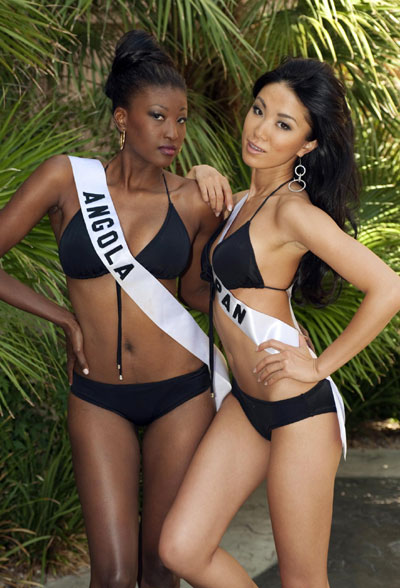
Luxury brands give inand put their goods online
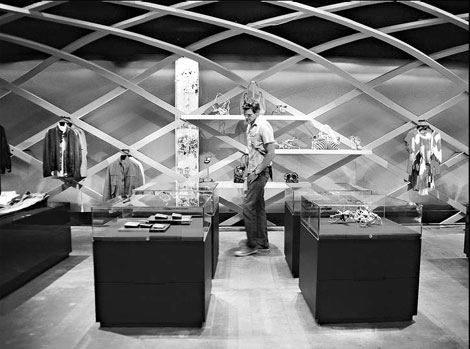
Risking the wrath of department stores, high-end clothing brands like Hugo Boss are selling wares on the nternet. Suzanne Dechillo / New York Times
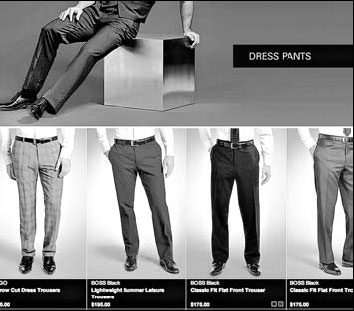 Among the offferings online at Hugoboss.com.
Among the offferings online at Hugoboss.com.
In the genteel world of luxury, companies long believed that the Web was no place for merchandising. And there was a gentleman's agreement with department stores not to siphon sales by reaching out directly to wealthy customers.
Then came the recession, and out went the niceties. Department stores slashed prices on $1,200 handbags, while luxury lines fretted about losing their exclusivity. Now, come September, marcjacobs.com is going retail, 10 years after most brands opened Web showrooms.
"I was so annoyed last year that I wished no one had our merchandise," said Robert Duffy, the president and vice chairman of Marc Jacobs. "All the department stores were panicked, and they were marking things down."
Other luxury brands - Jimmy Choo, Hugo Boss, Lancme, St. John, Kiehl's, Lilly Pulitzer, Donna Karan and La Perla - have started or soon will start selling their products through their Web sites. If it infuriates department stores or brings in customers who might have earned a glare from haughty clerks, who cares, as long as people are buying at full price?
"The recession forced these manufacturers to realize they needed to look for revenue wherever they could," said Jeffrey Max, chief executive of Venda, which handles technology for e-commerce sites.
Adding to the Web's appeal, profits are much higher on clothes sold directly to consumers, since no middleman takes a cut. And the brands can control pricing and styling.
When companies started to sell items online in the 1990s, most luxury brands paid little attention. By the mid-2000s, a few high-end companies were selling their products directly, but most didn't bother.
"Luxury brands were a little hesitant or reticent, because they were struggling with how to convey and create an experience that was rich," said Mark Brashear, chairman and chief executive for the Americas at Hugo Boss, which introduced its e-commerce site in April.
But by the time the luxury market slid last year, attitudes were changing.
"An elegant, sophisticated online store with a high level of data security can be had for a few hundred thousand dollars now - that's probably less than the legal fees to review a lease for a store on Fifth Avenue," Mr. Max said.
And in 2009, as the worldwide luxurygoods industry fell 8 percent, to under $230 billion, luxury sales online were forecast to grow 20 percent, according to Bain & Company, a global management consulting firm. Suddenly, the brands that had sniffed at e-commerce looked rather foolish.
For the final holdouts, battles with department stores pushed them over the edge. Department stores ordered too much inventory for 2009 and were left with piles of unsold clothes when consumer spending declined. The stores slashed prices - meaning less revenue for the clothing makers, along with a potential image problem when a $500 shirt sold for $200.
And at the end of July there was more bad news from luxury retailers, as new data for June showed that luxury department stores fared worse than department stores in general compared with a year earlier.
Unlike the snooty boutiques, the Web sites will welcome anyone. "I don't think they're trying to exclude anybody," said Jem Ripley, vice president at the marketing firm SapientNitro, which is designing sites for Hugo Boss and Kiehl's.
The department stores are responding by reinforcing their loyalty programs, offering discounts and doing aggressive e-mail marketing to customers.
But the brands are fighting back by, for example, selling special products only online. "I want to give people a reason to go there - if I have the same stuff on our Web site that's at Neiman's and Saks," the site would have little appeal, Mr. Duffy of Marc Jacobs said.
Asked if he was worried that retailers might be upset, Mr. Duffy said he was unconcerned.
"I'm the one that should get huffy that they have it on their Web site," he said.
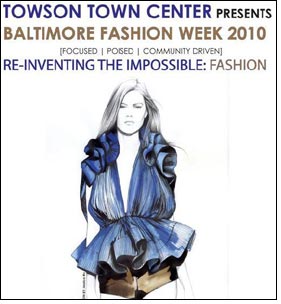 Entering into its third year is the annual fashion event Baltimore Fashion Week. This event is produced by Butterfly Productions, LLC, the event planning firm and home of Baltimore Fashion Week. Baltimore Fashion Week runs August 19 -22, 2010. This year’s event will be held at the Sheraton Baltimore North in the S Fitzgerald Ballroom.
Entering into its third year is the annual fashion event Baltimore Fashion Week. This event is produced by Butterfly Productions, LLC, the event planning firm and home of Baltimore Fashion Week. Baltimore Fashion Week runs August 19 -22, 2010. This year’s event will be held at the Sheraton Baltimore North in the S Fitzgerald Ballroom.
As the production phases continue to pile up, Founder/Chief Executive Producer Sharan Nixon, finally realized that she would have to let go and learn to delegate responsibility, but that has always been such a hard task for her since she started. During the “The Installation” the press party of Baltimore Fashion Week, she finally met her match. At the press party Nixon, met Darius L. Thompson and encouraged him to give her a call on Monday morning. He did and I guess as they say the rest is history.
“While at the press party I noticed his glasses, hair, and his boots. Those boots were all of it. We talked for a few minutes and I loved the way he spoke and from his style I could tell he would be a great asset to the team, and I was not wrong, stated Nixon.”
Darius Thompson attended the press party in the position of intern, but little did he know that on Monday, he would be just a little bit more than that. Thompson is now the Fashion Week Liaison for Butterfly Productions. Thompson is learning the trade to be a clone of Nixon.
As a normal practice Nixon usually gives everyone on the team a nick name, and the nick name she chose for Darius was Nigel. If you remember the movie “The Devil Wears Prada” Miranda Priestly had a Nigel, and Thompson is just that to Nixon, if not more.
Nixon stated, “Producing an event of this magnitude you need help. Entering into our 3rd year, I have realized that I cannot keep doing the parts of my job all by myself. Something has got to give, but in order for it to be given you need a strong person, a clone of myself and that is exactly what Darius is. We think alike and I feel confident that he has this event and this business in his best interests. That is something that is so hard to come by these days. In other words I trust Darius.”
Baltimore Fashion Week will begin in approximately 12 days on Thursday, August 19, 2010 and end on Sunday, August 22, 2010.
Over $125,000 in School Supplies Donated to New York City School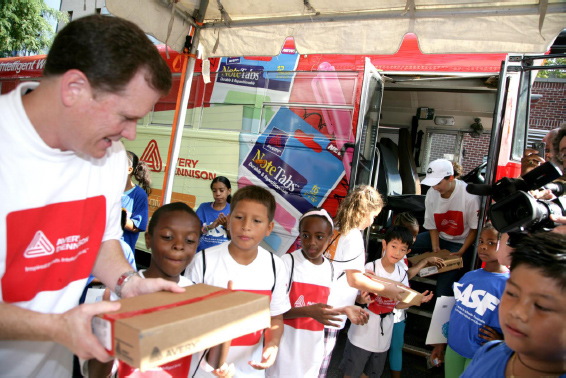
Avery Dennison North America Group Vice President Tim Bond loaded supplies into a school bus with Adolph S. Ochs School & Academy students on Wednesday, August 4th in New York City. As a part of the company's national Give Back to Schools program, Avery Dennison gifted the in-need New York City school with $125,000 worth of product and set the Guinness World Record for the largest amount of school supplies donated in a 24-hour period. The bus was wrapped in Avery Graphics' new MPI 1005 Supercast film by Skinzwraps at their Brooklyn facility.
PASADENA, Calif., -- August 4, 2010 -- Today in New York City, Avery Dennison set the Guinness World Record for largest amount of school supplies donated in a 24-hour period. Avery Dennison donated more than 8,500 pounds of school supplies to an in-need New York City school, shattering the record requirement of 1,102 lbs, 5 oz.
To establish the record, students from Adolph S Ochs School and Academy lined up at about 9 a.m. this morning to stuff a full-size school bus with the donated school supplies as part of the celebration. The feat was witnessed by an official Guinness World Record Adjudicator, who verified that the attempt adhered to the strict guidelines of the record category and presented Avery Dennison with a certificate documenting the new world record.
“I am so proud of what we accomplished here today: setting a new record that enables us not only to support a very deserving school, but also to help draw attention to the needs of schools throughout the country,” said Tim Bond, Group Vice President, Avery Dennison Office Products North America. “Avery Dennison is committed to helping parents and teachers across America provide students with the highest-quality education possible, and the school supplies are vital to that success.”
Guidelines for the record category stipulate that three elements must be present in all Guinness World Record proposals: an idea that is measurable, breakable and verifiable.
“We are very excited about Avery Dennison Guinness World Records attempt for Largest Amount of School Supplies Donated in 24 Hours. This is an entirely new record category that was inspired by Avery Dennison's unique proposal," said Danny Girton, Corporate Adjudications Manager, Guinness World Records. “This record attempt is a story with a heart, which is what Guinness World Records is all about: ordinary people striving to achieve extraordinary things."
The record setting event is a part of the Avery Dennison Give Back to Schools program that was created in celebration of the company’s 75th anniversary as a way to give back to the communities that have made the company’s success possible. The program will provide 10 very deserving U.S. schools with Avery® premium school supplies.At the conclusion of the contest on September 5, the 10 schools with the highest number of votes will each win Avery-brand school supplies valued at approximately $10,000.
About Avery Dennison:
Avery Dennison (NYSE:AVY) helps make brands more inspiring and the world more intelligent. For 75 years the company has been a global leader in pressure-sensitive technology and materials, retail branding and information solutions, and organization and identification products for offices and consumers. A FORTUNE 500 company with sales of $6 billion in 2009, Avery Dennison is based in Pasadena, California and has employees in over 60 countries.
A recent survey data shows that 23.8% of clothing consumed by netizen through online sales in China, the value of online shopping will reach to 1 trillion yuan by year of 2013 if it grows at current speed.
The total trade value in Taobao online shopping exceeded 200 billion yuan in 2009, and has climbed to 100 billion yuan in the first quarter. Apparel sales rank the first for fourth consecutive year and amount to 18.3 billion yuan in 2009. Sports shoes and sportswear are the growth fastest products for online shopping. Also foreign data shows shoe sales on ZAPPOS reached to $800 million in 2008.
Chinese Premier Wen Jiabao said on his recent trip to Zhejiang for inspection that e-commerce is a marketing breakthrough that has changed traditional shopping way, it has great potential on future development. China has 300 million people registered the internet user, and 100 million have online shopping experiences. So no one can deny such potential market, which is treasure place to be developed for leather products.
Normally it is sluggish season in summer market for footwear sales in Wenxian area, but production is quite busy on many shoemaking companies. Footwear sales are good beyond our expectation, said some of shoemakers.
Due to rapid growth in recent years Wenxian has become an important sandal production base in China, and a leading industry for local economy. Now footwear made in Wenxian are sold to more than 20 countries including United States, Germany, Russia, Canada and so on.
For promoting the industry sustainable growth, Wenxian county has taken varieties measures to attract investment from costal areas, now they invest total 65 million yuan on building of a large scale footwear and its material distributing center, and launched a construction of a footwear production park in the Industrial Clustering area in the county. Three shoemakers plan to locate their production in the park with total investment of 380 million yuan. As one of 100 key projects for the county a rubber footwear production project has started their production in may of this year.
With increase power and strength now Footwear giant of Fuguiniao in Fujian province began to provide medical insurance, pension insurance, and unemployment insurance for its employees. Resources Center Director said the company will spend nearly one million yuan per month for payment of staff’s insurances, although increased the production costs, it has greatly improved the living welfare for migrant workers.
Comparing with other companies there are restrictions on overtime working, overtime working is not allow in the company. In the first half millions yuan have spent on an entertainment center special for its employee, fitness coaches in Jimei Institute of P.E are invited for fitness guidance. People can have the pleasure time on the center that is much helpful to release strains and health to their body.
Further more Fuguiniao Group also provides training opportunity for their employees, so for nearly one thousand employees have attended professional training classes. The responsible person said our training program may improve their skills and capability for employment. All the new workers should have the training on classes of production, marketing, management and enterprise’s culture, special training are also arranged for technical and marketing personal according to company’s demand.
Chinese companies should look for more cooperation opportunities with the Association of Southeast Asian Nations (ASEAN) to realize the full advantages of the free trade agreement between the two, government officials said on Monday.
"The government will actively encourage companies planning overseas ventures to invest in ASEAN countries," said Vice-Commerce Minister Gao Hucheng.
ASEAN countries' investment in China is far higher than the nation's investment in these countries over the past 30 years, Gao said.
The cumulative two-way investment between the two regions stood at $69.4 billion by the end of last month. Of this, ASEAN investment in China was around $59.8 billion, while China's non-financial investment in ASEAN was $9.6 billion,
During the first six months of the year, ASEAN's investment in China was $3.1 billion and China's non-financial investment in ASEAN was $1.2 billion, according to data from the Ministry of Commerce.
"China's investment in ASEAN countries has been growing especially in sectors like infrastructure, telecommunications, electric power, labor cooperation and contracting services," Gao said.
Lower labor costs and abundant natural resources in the ASEAN countries are attractive reasons for Chinese companies to consider investments, said Xu Xiaoning, executive secretary-general of the China-ASEAN Business Council.
Xu said Chinese companies who are already present in these countries could seek more opportunities by taking advantage of the free trade agreement.
Domestic companies can look for opportunities in emerging markets like Indonesia, as it now has stable policies for Chinese migrants, said Xu.
Bilateral trade between China and ASEAN rose to $136.5 billion in the first half of the year, up 55 percent year on year. It is also 11 percentage points higher than the growth rate of the nation's overall imports and exports during the same period. That puts ASEAN on track to be China's No 4 trading partner, after the European Union, the United States and Japan.
Stimulus policies aimed to boost economic growth, especially the steps taken to expand domestic demands, have created more business opportunities for ASEAN countries, Gao said.
The China-ASEAN Free Trade Agreement, the world's largest free trade area, officially came into effect on Jan 1 this year. The average tariff on goods from ASEAN countries was cut to 0.1 percent from 9.8 percent.
The six original ASEAN members, Brunei, Indonesia, Malaysia, the Philippines, Singapore and Thailand, cut the average tariff on Chinese goods from 12.8 percent to 0.6 percent.
At the same time, the free trade area has also caused some worries in ASEAN countries, as some textile, shoe making, and steel companies are worried that Chinese goods will impact them.
"China and the ASEAN countries should advance their industrial cooperation and help ASEAN companies' enter the Chinese market in a big way so as to have a win-win situation for both regions," said Zhang Wei, vice-chairman of the China Council for Promotion of International Trade.
Zhang said the seventh China-ASEAN Business and Investment Summit in October would focus on the prospects and challenges for the regional economy and trade cooperation after the establishment of the free trade area.
Chinese American fashion designer Jason Wu's collections are the favorite of U.S. First Lady Michelle Obama. Now, he is wooing the fashion world with his new line of Cissy dolls styled for Madame Alexander.
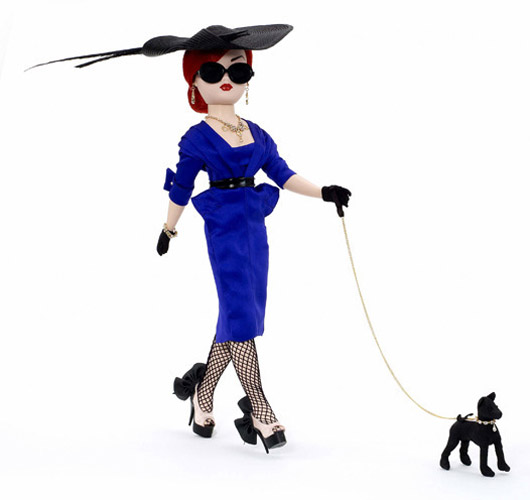
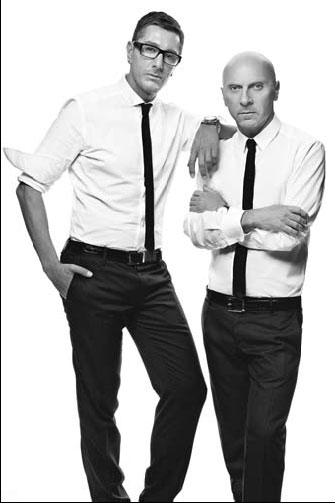
This season Dolce & Gabbana celebrated the 20th anniversary of their menswear line with an exhibition at their home in Milan.
The celebration included a multimedia exhibition, a dazzling fashion show, and a gala featuring a number of A-list guests: Juliette Binoche, Morgan Freeman, Matthew McConaughey and Camilla Alves.
Though the Italian design duo Domenico Dolce and Stefano Gabbana have not been to China yet, they are keen to do so.
"We have not been able to come to China yet, but we would like to do it soon. From what we understand, the Chinese consumer is a very careful and well-informed one. Because he can have access to everything he wants, he has learned how to chose according to his own taste and personality," Gabbana says in an e-mail interview with China Daily.
Dolce agrees. He believes Chinese men are catching up with fashion trends and creating their own styles.
"Nowadays, consumers all over the world are very similar. They all go and buy at the same places for the same products, which are available at the same time everywhere. Today is really different from the past when certain things could only be bought in the boutiques of via Monte Napoleone or in Paris and New York," Dolce says.
Dolce & Gabbana now owns less than 10 boutique stores in China. At the end of May, it opened the largest retail store in Shanghai's luxury-gathering Plaza 66.
The brand offers a "metropolitan style" for Chinese men: low-waist jeans, bleached and shredded pants, narrow suits, sexy vests and sportswear shoes.
The pair's great success lies in their understanding of what people want from them. Gabanna says the underlying principles have remained the same since the beginning: sartorial tradition mixed with Sicilian aesthetic, through the use of technology, playing with contrasts, a lot of research on proportions and materials and attention to details.
"Dolce & Gabbana has never had a real boom. It has grown little by little, season after season," he adds.
"But at a certain point, we were tempted to explore new ways, and this exploring was useful to understand who we are and what we can do and we like to do," Dolce suggests.
The duo says their inspiration comes from everyday life, a movie, a song, or people walking down the street.
According to a poll in sohu.com, 84 percent of Chinese males believe Italian and French fashion labels provide the best quality and catch the latest trends. Gabbana says their brand's spirit is "deeply Italian, or better, Sicilian," and that is why their brand is the apple of many Chinese men's eyes.